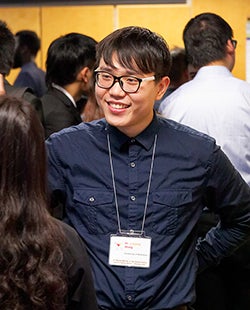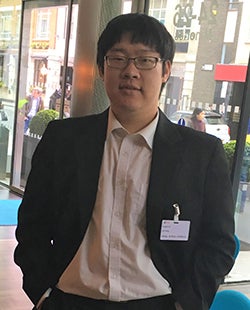For two graduate students at Waterloo, unraveling the mysteries of the human genome requires more than just science. These two students, both given a departmental research presentation award by the Department of Statistics and Actuarial Science, are passionate about bringing their skills to the field of biostatistics.

With the help of his supervisor Professor Grace Yi, Qihuang was able to conduct biostatistical research – an area that he has been passionate about since his master’s.
“We all know that our DNA associates with a lot of traits like our height, our skin colour, and our eye colour. There’s definitely an association between those traits and the genetic information. My research is that although there is some kind of association, this association is in fact much more complex because there’s not only one single gene that could control outcomes,” Qihuang explained.
“My research is to create statistical models and model this kind of interaction among these genes. It’s basically like incorporating a graphical structure of our genes into our statistic model so that we can figure out how those genes themselves are connected with each other.”
This wasn’t Qihuang’s first dip into genetic studies. During his master’s program, he took part in an eight-month co-op position at the Princess Margaret Hospital in Toronto. In his time there, he helped design clinical trials to study genetics, and how certain genetic information can impact patient treatment.
Qihuang credits his supervisor for encouraging him to pursue his passions as he continues to expand his knowledge of genetic association through his research.

“I think this is the best teaching quality I’ve ever seen,” Ce said. “The supervisors are very nice, they love to devote their time to students.”
Now pursuing a PhD in Statistics, Ce’s supervisors Professors Liqun Diao and Richard Cook have provided support and guidance throughout his second-year research study. Ce’s research topic sought out how to maximize resources in longitudinal genetic data studies.
“Basically, in real life, you may want to study some associations between responses and hidden information. It could be a biomarker for some genetic information, for example. The problem is, it could be very expensive. Genetic testing is too costly to conduct for everyone,” Ce explained. “How would you select people to conduct those measurements for the hidden information? How would you spend your limited resources to maximize efficiency?”
While Ce’s research received distinction within his department, his successes were accompanied by several challenges.
“You’ve got to tell yourself once you move to a new environment that there will be a lot of things for you to learn and you have to be patient. As long as you treat yourself as fresh and are willing to spend more time and see weaknesses to improve on, everything will be smooth.”
Looking forward to the future, Ce and Qihuang both plan on pursuing careers in academia, where they can continue conducting biostatistical research and conducting clinical trials.